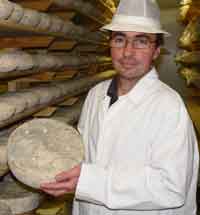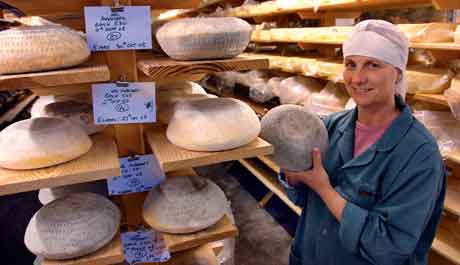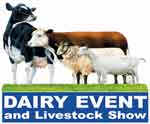Farmhouse cheesemaker defies the recession

No business can ever claim to be completely recession proof, but High Weald Dairy in West Sussex is surviving the economic downturn better than many.
Developed by Mark Hardy and his wife Sarah, the business specialises in converting sheep, cow and goat milk into a range of speciality organic and non-organic cheeses, with a strong local identity.
“Yes, we’ve seen some loss of sales in the supermarkets as a result of the recession,” says Mark. “But the bulk of our trade is direct to customers, and this has held up remarkably well. We make a lower margin on supermarket sales anyway, so while we are now selling a bit less cheese, our profitability has not suffered substantially.”
High Weald Dairy was formed in 1988 and has grown organically – no pun intended – ever since.
Mark actually started milking sheep back in the mid-1980s. He’d just finished at Cirencester and returned to his father’s 12ha (30-acre) Putlands Farm at Duddleswell in East Sussex.
Like many young farmers at the time, Mark was attracted to milking sheep because it was relatively low cost to get started and was totally divorced from milk quotas, which had just been introduced and were prohibitively expensive for the new entrant.
Initially the milk from his herd of Friesland sheep was sold for drinking, capitalising on the fact that sheep’s milk is good for people with lactose intolerance and protein allergies.
Further information |
|---|
Interested in getting into Farmhouse cheesemaking? There is a wealth of information to be found at the British Sheep Dairying Association, at the Specialist Cheese Association and at the British Cheese Board. For more information on High Weald Dairy click here |
“The original plan was to supply sheep’s milk to a new cheese plant in south London. But that never materialised, so we decided to do the job ourselves,” he recalls. “I took myself off to Cyprus for two weeks to learn about cheesemaking, invested in the necessary equipment and, within a few months, we were selling 5kg bags of halloumi direct to the Cypriot supermarkets in north London.”
As demand grew, the Hardy’s linked up with another nearby farmer, letting him milk their sheep along with his own ewes, while they set up High Weald Dairy to concentrate on cheesemaking.
New cheeses were developed, more milk sourced from other dairy sheep farmers and a delivery round set up to supply more local shops and delicatessens.
“One of the problems we encountered in the early 1990s was that the supply of our products was erratic, while our customers’ demand was constant,” says Mark. “Sheep generally only lactate for about five months. While you can freeze sheep’s milk for up to six months, we needed a more steady throughput.”
To overcome this, High Weald Dairy started processing organic cows’ milk, sourced from three farms in the south of England. “Organic milk was starting to take off and it was a niche product that fitted into our market place.”
By the end of the 1990s the business was starting to outgrow its site on Putlands Farm, so the decision was taken to relocate to Tremains Farm near Horsted Keynes in West Sussex.
It was a logical move, since the 142ha (350-acre) farm already had a fully organic dairy herd, providing a convenient source of milk. “We decided to take an old grain store back in hand and, with the help of a 30% processing and marketing grant, converted it into a dairy and office block for the cheese business,” says Mark.
This was completed in 2003 since when the business has continued to grow. It now processes about 190,000 litres of cows’ milk a year bought from Tremains Farm at the going OMSCo rate of about 34-38p/litre. Another 200,000 litres of sheep’s milk is bought in at a cost of 90p-£1.05/litre delivered, depending on the time of year.
Total cheese production now stands at 80-90t a year.
Running a successful business
Marketing, customer service and having the right products are the keys to business success for High Weald Dairy.
The company produces 12 different types of cheese. Top sellers on the sheep’s milk side include Duddleswell and Sussex Slipcote, while Ashdown Forester, Saint Giles and Tremains Cheddar dominate the cows’ milk side.
The cheeses have been developed over the years by Mark and the company’s two resident cheesemakers – Michael Wisdom and Colin Brinkhurst. “Making cheese falls somewhere between an art and a science,” says Sarah, who looks after the sales and marketing. “Our two cheesemakers have different approaches and each cheese is very individual. Making a wide variety can be a logistical headache, but we find that it is more economic to carry a good range to keep our customers satisfied.”
The business initially grew up by making direct sales to local delicatessens, farm shops and farmers’ markets, using the company’s two vans. “We also supply three of the main supermarkets and two years ago we decided that we would do more with them and with wholesalers – after all, we’re cheesemakers, not a delivery company,” says Sarah.
But this policy has now changed back and High Weald Dairy is once again focused on supplying its local market. “It’s true, you can sell a lot more cheese if you get in with the supermarkets. But you also lose control and are much more vulnerable to their whims.
“For example, they demand at least 75% of the product’s shelf life into store and if there is cheese in their distribution depot with less than this, it gets returned and we have to find another outlet at short notice. That adds to our transport costs and makes us weaker sellers.”

Just 20% of the company’s cheese now goes to supermarkets, and another 20% to wholesalers. The rest is for local sales, with about 200 outlets in London, Sussex, Kent and Surrey taking regular deliveries.
The focus is very much on service. “Each week we phone our customers to confirm their orders. They nearly always have them ready, but, like most people, are very busy,” says Sarah. “If we waited for them to ring us they would phone at the last minute and we’d end up paying overtime to get the orders out.”
Selling locally also makes it easy to develop new varieties. Having a one-to-one relationship means it’s easy to persuade retailers to try something different, and customer feedback is essential.
As part of its offering, High Weald Dairy also includes free bags of ready-diced cheese, plus explanatory leaflets, with any new variety to help retailers sell their cheese. “They don’t get this from anyone else.”
The Hardy’s believes that, while developing any new business takes drive and determination, there is still scope for dairy farmers to get into cheesemaking.
“Life is more complex than when we set out 25 years ago, and there are many more hoops to pass through. But there is still a margin for those who get it right. And the fact that this year’s British Cheese Awards has seven new cheesemakers entered shows there is still room for new blood.”
New cheeses
High Weald Dairy has recently launched two new cheeses – Brother Michael and Sister Sarah.
“Getting the name right is always a challenge,” says Sarah. “We always like to keep it local and have a story to tell. Brother Michael is actually a pungent, brine-washed trappist-type cheese and is made by our cheesemaker Michael, hence the name Brother Michael.
“Sister Sarah, our new goat’s cheese, was named after me.”
Both have been awarded medals in the “new cheese” category of this year’s British Cheese Awards.
Getting value from the dairy event
Want to find out more about adding value to raw milk? This year’s Dairy Event and Livestock Show, which takes place at Stoneleigh Park, Warwickshire, on 16 and 17 September 2009, is the place to go. There will be more than 460 exhibitors on the site, including many processors and equipment manufacturers. For tickets and more information visit the Dairy Event website or phone 0845 458 2711 |
|---|

